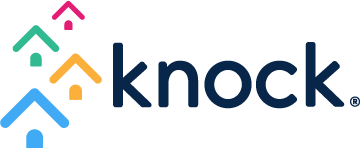5 Signs That Your Multifamily Property Needs a CRM System
We may be biased, but a CRM software solution can be the most influential factor in turning leads to leases and increasing your NOI.
Simply put, CRM (Customer Relationship Management) is a strategy that aids in enhancing and strengthening interactions with prospects and customers. The tools that we rely on for enhancing customer relationships have evolved over the years, from sticky notes and Rolodexes to cloud-based SaaS (Software as a Service) products being the global industry standard.
CRM is the largest and fastest growing technology segment in the world, according to Gartner. As it continues to grow, Gartner predicts that CRM designed for the specific sales processes of unique industries will become more common (enter Knock®).
Here are five signs that your multifamily community needs a CRM solution — one built exclusively for multifamily property management.
1. Without a multifamily CRM, you’re missing out on leads.
Leads in the multifamily industry are more than just numbers and transactions. They’re real people, with real emotions, making a real long-term commitment, with real money. Committing to a long-term lease is stressful enough, why make the process any harder than it already is?
Simplifying the leasing process and allowing prospects to communicate with you how THEY want helps to create a lasting sense of responsiveness and trust. Some leads may want to meet with you in person, some may want to call, or text, or email, or even contact you through social media. Modern CRM software should seamlessly facilitate interactions on all of the above channels of communication — and more. By offering more ways for leads to reach you and by simplifying the communication process, a proper CRM system will increase lead volume and quality.
2. You’re unable to keep up with lead volume.
Can you have too many leads? No, but if you are in the fortunate situation of being bombarded with leads and your team is struggling to keep up, a CRM can help. With an industry average response time of 39 hours, it’s no wonder why the leasing process is seen as cumbersome and a hassle.
Customer expectations are evolving — with on-demand and self-service features setting the baseline — the way you engage your future renters makes all the difference. Customers expect to receive a response to their communications in under 90 minutes — and within 90 seconds if it’s a text message. If your community is falling short of these expectations, chances are that you are losing potential leases every day due to abandonment.
An effective CRM will pre-qualify all incoming leads, provide an instant response to any inquiry, and notify your team of next steps to be taken — all in a seamless and organized manner.
3. Your customer data is hard to locate.
Speaking of organization, does this system sound familiar: spreadsheets, email, and overstuffed file cabinets? Sure, this works for small teams, but as teams and portfolios grow, these tools prevent your organization from keeping transparent records of communications and drastically reduces the speed in which they can service leads and residents alike. All customer data should be centralized, easy to aggregate, simple to update, and integrate across the rest of your tech stack. If finding any particular customer profile or detail takes more than just a few clicks, then chances are you are ready to adopt a CRM system.
4. You don’t know what your leasing teams are up to.
It is vital to understand how your leasing team is performing and how to best allocate future time and resources. Furthermore, the auditability of communications is critical for review, training, and program development. Nichole Granquist, Director of Revenue and Leasing at Pioneer Acquisitions, says, “As a manager, it is important to see what the team is spending their time on and be able to help them be more efficient with their time.”
Your CRM software should not only show activity and interaction metrics of leasing teams, but should record, store, and secure all communications — whether they are written or verbal communications and regardless of the channel.
5. Your reporting process takes too much time.
If your leasing team is spending more time inputting data than selling units, then it’s time for CRM. Manual data entry should be kept to a minimum and your CRM should be doing a majority of the legwork — including filling in blank data fields and auto-populating the ones that are available through API integrations.
A proper CRM reporting system should offer you a transparent and up-to-the-second view of any and all data that you have — and should create any customized report on-demand with one click. Reporting should be viewed as an insightful tool that allows us to make agile business decisions, not a cumbersome task that detracts attention from the important.
Commit to Better Leasing Results
If you or your community have dealt with any one of these 5 issues, then it is time to look for a CRM solution. Are you ready to implement award-winning CRM at your property? Schedule your demo of Knock today, and see for yourself what the future of leasing looks like!
